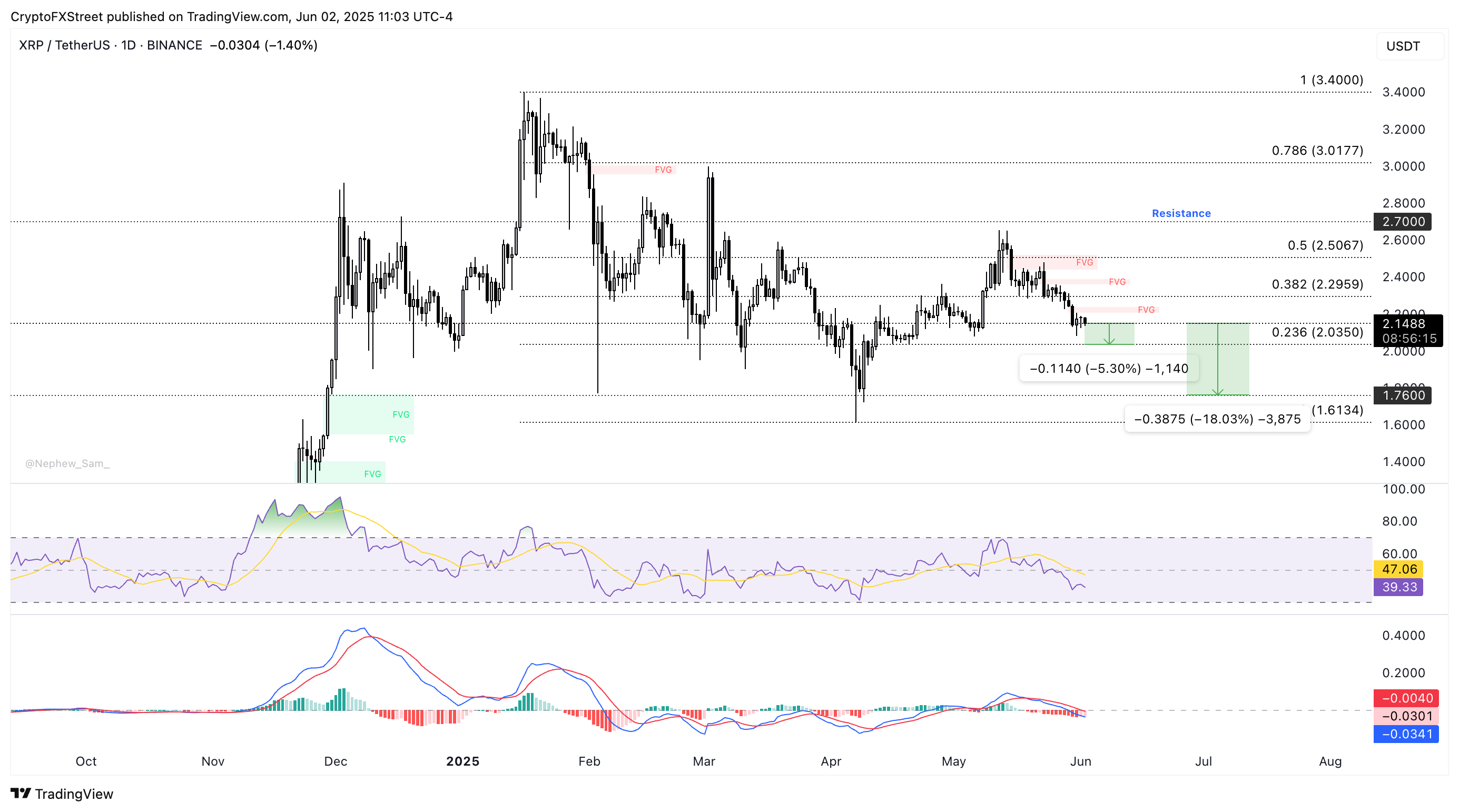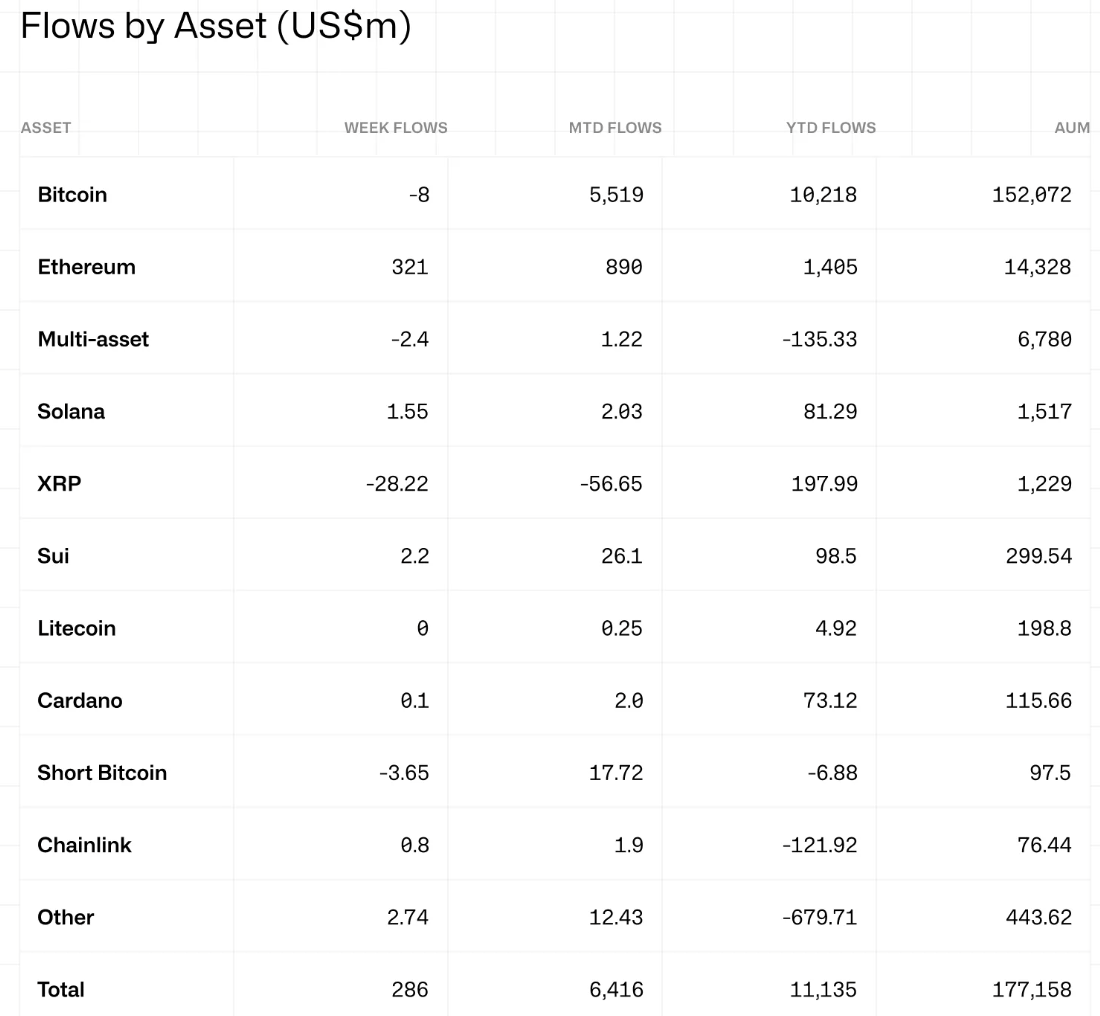- XRP technical indicators on the daily price chart support the likelihood of further correction.
- XRP extends its losses by nearly 1% on Monday, with bears eyeing the $1.7600 support level, which has been in place for nearly six months.
- XRP investment products led altcoins, with over $28 million in outflows last week.
Ripple (XRP) faces legal uncertainty in its battle with the United States (US) Securities and Exchange Commission (SEC), and the XRP price continues to slide. At the time of writing, XRP is trading at $2.1540, down 1.20% in the day.
Bitcoin’s consolidation has led to uncertainty among crypto traders, and the risk-off sentiment is evident from outflows piling into XRP investment products.
XRP traders need to watch the daily price chart closely for signs of reversal in the altcoin’s price trend this week.
XRP technical analysis
While Ripple tackles its legal battle with the SEC, an unexpected third party has submitted a filing questioning the interpretation of the Howey Test, raising concerns in the lawsuit. The daily price chart suggests further decline is likely in XRP amidst legal issues.
XRP has consolidated under the $2.7000 resistance for nearly three months. Key support levels are $2.0350, the 23.6% Fibonacci retracement of the decline from the $3.4000 top to the $1.6134 low, and $1.7600, a key support that held for nearly six months.
An 18% drop could see XRP test support at $1.7600 if the altcoin extends losses this week.
The Relative Strength Index (RSI) and Moving Average Convergence Divergence (MACD) support a bearish thesis for XRP. RSI reads 39 and is sloping downward, and MACD flashes red histogram bars under the neutral line.

XRP/USDT daily price chart | Source: TradingView
Conversely, key resistances are 38.2% Fibonacci retracement level and the 50% Fibonacci placeholder at $2.2959 and $2.5067.
Market overview: Catalysts influencing Ripple lawsuit, XRP price
The new filing that emerged in the SEC vs. Ripple lawsuit has prompted pro-crypto attorneys to comment on the uncertainty in the legal battle’s resolution.
Other factors like rising outflows in XRP-focused investment funds, $28 million last week, as recorded by the CoinShares Digital Assets fund flows report, are influencing the sentiment among XRP holders and market participants.
The report shows that XRP led losses among altcoins while Ethereum led the gains.

Crypto asset weekly flows | Source: CoinShares
Typically, outflows support a bearish thesis and represent a declining interest and investor participation, while inflows signal rising demand and support a bullish thesis.
SEC vs Ripple lawsuit FAQs
It depends on the transaction, according to a court ruling released on July 14, 2023:
For institutional investors or over-the-counter sales, XRP is a security.
For retail investors who bought the token via programmatic sales on exchanges, on-demand liquidity services and other platforms, XRP is not a security.
The United States Securities & Exchange Commission (SEC) accused Ripple and its executives of raising more than $1.3 billion through an unregistered asset offering of the XRP token.
While the judge ruled that programmatic sales aren’t considered securities, sales of XRP tokens to institutional investors are indeed investment contracts. In this last case, Ripple did breach the US securities law and had to pay a $125 million civil fine.
The ruling offers a partial win for both Ripple and the SEC, depending on what one looks at.
Ripple gets a big win over the fact that programmatic sales aren’t considered securities, and this could bode well for the broader crypto sector as most of the assets eyed by the SEC’s crackdown are handled by decentralized entities that sold their tokens mostly to retail investors via exchange platforms, experts say.
Still, the ruling doesn’t help much to answer the key question of what makes a digital asset a security, so it isn’t clear yet if this lawsuit will set precedent for other open cases that affect dozens of digital assets. Topics such as which is the right degree of decentralization to avoid the “security” label or where to draw the line between institutional and programmatic sales persist.
The SEC has stepped up its enforcement actions toward the blockchain and digital assets industry, filing charges against platforms such as Coinbase or Binance for allegedly violating the US Securities law. The SEC claims that the majority of crypto assets are securities and thus subject to strict regulation.
While defendants can use parts of Ripple’s ruling in their favor, the SEC can also find reasons in it to keep its current strategy of regulation by enforcement.

























